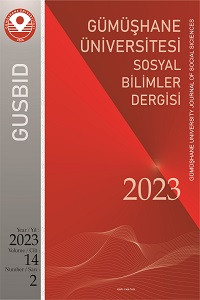Abstract
ABD Yunanistan ilişkileri İkinci Dünya Savaşı sonrası ortaya çıkan uluslararası politika yapısı açısından büyük öneme sahiptir. Bu önemin temelinde ABD'nin önce SSCB ardından da Rusya Federasyonu'nu çevreleme politikasında Yunanistan'ın sahip olduğu stratejik avantaj yer almaktadır. Yunanistan'ın bu avantajı Soğuk Savaş döneminde ABD tarafından askeri ve ekonomik açıdan desteklenmesini sağlamıştır. Yunanistan bu avantajını Soğuk Savaş sonrası dönemde de koruma politikası yürütmüştür. Ancak Yunanistan hem Soğuk Savaş döneminde hem de Soğuk Savaş sonrası dönemde ABD ile ilişkileri gerginlik seyrindeyken farklı alternatiflere sahip olduğunu gösterecek adımlar atmıştır. Yunanistan'ın bu politik tutumu ABD'nin ittifak ilişkisini koruma refleksi doğrultusunda adımlar atmasını tetiklemiştir. Böylece ABD yeteneklerin dağıtımını Yunanistan lehine yönetme şeklinde yapının dengesini sarsabilecek bir politik döngüyü başlatmıştır. ABD'nin bu politikası İkinci Dünya Savaşı sonrası ortaya çıkan ittifak yapısını bozma potansiyeline sahiptir. Bu çalışmada Yapısal Realizmin yeteneklerin dağıtımı odağında ABD-Yunanistan ilişkilerinin yapıya dönük olumsuz etkileri analiz edilecektir.
References
- Altman, J. (2016). Russian A2/AD in the Eastern Mediterranean. Naval War College Review, 69(1), 72-85. https://digital-commons.usnwc.edu/nwc-review/vol69/iss1/5.
- Bayar, M., & Kotelis, A. (2014). Democratic Peace or Hegemonic stability? The Imia/Kardak Case. Turkish Studies, 15(2), 242-257. https://doi.org/10.1080/14683849.2014.933948.
- Binder, D. (2012). Greece, Turkey, and NATO. Mediterranean Quarterly, 23(2), 95-106. http://en.jmc.uoa.gr/fileadmin/jmc.pspa.uoa.gr/uploads/PDFs/Greece__Turkey__and_NATO.pdf.
- Brown, J. (1975). Modernity Confronted: The Ghost of Pericles in Post-War Greece. Polity, 8(2), 311-316. doi/abs/10.2307/3234207.
- Çoban, S., & Taşkın, E. (2018). Burden Sharing at NATO and the Battle of 2 Percent. Horizon Insights, April/June (2), 59-75. 10.31175/hi.2018.02.
- Coman, R., & Volintiru, C. (2023). Anti-liberal ideas and institutional change in Central and Eastern Europe. European Politics and Society, 24(1), 5-21. https://doi.org/10.1080/23745118.2021.1956236.
- Coufoudakis, V. (1983). Greco-Turkish Relations and the Greek Socialists: Ideology, Nationalism and Pragmatism. Journal of Modern Greek Studies, 1(2), 373-392. 10.1353/mgs.2010.0045.
Abstract
The relations between the US and Greece are of great importance in terms of the international political structure that emerged after the Second World War. The basis of this importance lies in the strategic advantage of Greece in the US' policy of containment the USSR and then the Russian Federation. This advantage of Greece ensured that it was supported militarily and economically by the US during the Cold War period. Greece maintained this advantage in the post-Cold War period as well. However, Greece has taken steps to show that it has different alternatives when its relations with the US were in tension both in the Cold War period and in the post-Cold War period. This political attitude of Greece triggered the US to take steps in line with the reflex of protecting the alliance relationship. Thus, the US initiated a political loop that could shake the balance of the structure in the way of managing the distribution of talents in favor of Greece. This policy of the US has the potential to disrupt the alliance structure that emerged after the Second World War. In this study, the negative effects of the US-Greece relations on the structure will be analyzed with the focus on the distribution of capabilities of Structural Realism.
References
- Altman, J. (2016). Russian A2/AD in the Eastern Mediterranean. Naval War College Review, 69(1), 72-85. https://digital-commons.usnwc.edu/nwc-review/vol69/iss1/5.
- Bayar, M., & Kotelis, A. (2014). Democratic Peace or Hegemonic stability? The Imia/Kardak Case. Turkish Studies, 15(2), 242-257. https://doi.org/10.1080/14683849.2014.933948.
- Binder, D. (2012). Greece, Turkey, and NATO. Mediterranean Quarterly, 23(2), 95-106. http://en.jmc.uoa.gr/fileadmin/jmc.pspa.uoa.gr/uploads/PDFs/Greece__Turkey__and_NATO.pdf.
- Brown, J. (1975). Modernity Confronted: The Ghost of Pericles in Post-War Greece. Polity, 8(2), 311-316. doi/abs/10.2307/3234207.
- Çoban, S., & Taşkın, E. (2018). Burden Sharing at NATO and the Battle of 2 Percent. Horizon Insights, April/June (2), 59-75. 10.31175/hi.2018.02.
- Coman, R., & Volintiru, C. (2023). Anti-liberal ideas and institutional change in Central and Eastern Europe. European Politics and Society, 24(1), 5-21. https://doi.org/10.1080/23745118.2021.1956236.
- Coufoudakis, V. (1983). Greco-Turkish Relations and the Greek Socialists: Ideology, Nationalism and Pragmatism. Journal of Modern Greek Studies, 1(2), 373-392. 10.1353/mgs.2010.0045.
Details
| Primary Language | English |
|---|---|
| Journal Section | Articles |
| Authors | |
| Publication Date | June 12, 2023 |
| Submission Date | February 3, 2023 |
| Published in Issue | Year 2023 Volume: 14 Issue: 2 |



